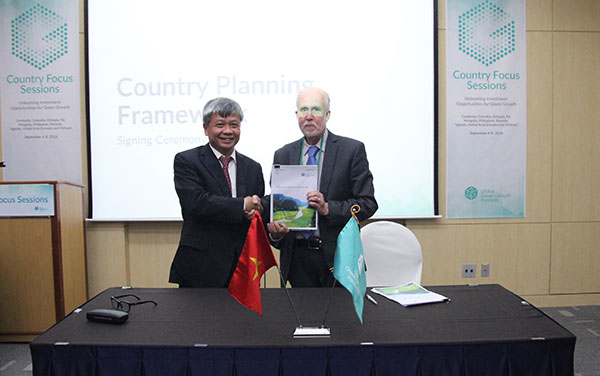South Korea’s GGGI pushes for sustainable growth
 |
At last week’s Global Green Growth Week 2016, organised by Global Green Growth Institute (GGGI) on South Korea’s Jeju Island, Vietnam’s Ministry of Planning and Investment (MPI) and GGGI signed an agreement on a five-year partnership strategy, which aims to ensure Vietnam’s rapid economic growth is accompanied by a sustainable, inclusive and comprehensive environmental strategy.
This strategy, known as the GGGI Vietnam Country Planning Framework 2016-2020 (CPF), outlines three main objectives.
Firstly, green growth should be integrated into socio-economic planning strategies to ensure the economy expands while protecting environmental integrity.
Secondly, Vietnam’s rapidly growing cities should meet citizens’ needs by promoting sustainable production and consumption of energy and natural resources.
Lastly, public and private finance should be channeled toward energy, transportation, and industrial infrastructure that is environmentally sound.
MPI Deputy Minister Nguyen The Phuong, who signed the CPF, stated that the strategy “will help Vietnam realise green growth goals in both the short and long term.”
“In the short-term, the first priority is co-operation to strengthen institutions and policies regarding green growth. The second priority is to support capacity building for the social and economic development associated with green growth, including the mobilisation of resources for implementation,” he said.
Adam Ward, GGGI’s country representative for Vietnam, told VIR that this five year (2016-2020) country strategy of GGGI and Vietnam’s government “shows GGGI’s and Vietnam’s strong commitment to working together to deliver green growth in the finance, urban and energy sectors.”
The strategy was developed under the guidance of the MPI to identify niche areas for GGGI given their skills and the demands of the government.
“The work cuts across policy, right through to the development of bankable projects to access finance for implementation. The strategy benefited from input from all relevant ministries, development partners, civil society, and the private sector,” Ward said.
According to the CPF, over the next five years, Vietnam’s Government and GGGI will support delivery of Vietnam’s Nationally Determined Contribution, Sustainable Development Goals, and GGGI’s corporate strategy by working across three outcomes.
With outcome one, green growth objectives are mainstreamed into development planning processes and national financing arrangements. Specifically, GGGI will work to mainstream green growth into the Socio-Economic Development Strategy and Plan, as well as roll out the Investment Guidelines for Green Growth. In addition, GGGI will work to strengthen an existing national financing vehicle, and partner with MPI and Vietnam Development Bank (ADB) on ‘greening’ their lending portfolios.
In outcome two, green energy uptake is increased through enhanced enabling environments and the development of bankable projects. This outcome will focus in the geothermal, waste-to-energy and solar sub-sectors, and work on strategic policy advice such as the necessary feed-in tariffs. GGGI will partner with ADB and GIZ to develop bankable projects.
Meanwhile, for outcome three, green growth is integrated into Vietnam’s urban development strategies and bankable projects are developed. GGGI will develop a national urban green growth strategy, green master planning guidance for cities and a national programme on green urban development. Bankable projects will be developed in infrastructure gaps such as urban wastewater.
According to GGGI, in Vietnam, urban populations have increased at 3 per cent annually, which has resulted in worsening air and water quality. Vietnam’s most recent greenhouse gas emissions inventory shows a 602 per cent increase since 1990.
Moreover, emissions growth per unit of GDP has surpassed all other Asia-Pacific developing countries except China. The emissions are a result of the power generation, transport, industrial and cement sectors.
The burning of coal is a major contributor; coal currently occupies over 36 per cent of electricity capacity, and by 2030, coal-fired stations are expected to supply 56 per cent of national electricity demand.
GGGI began working in Vietnam in 2011, with Vietnam being a founding member country of GGGI. GGGI has collaborated on implementing the country’s Green Growth Strategy, spanning the finance, water and urban sectors.
What the stars mean:
★ Poor ★ ★ Promising ★★★ Good ★★★★ Very good ★★★★★ Exceptional
Latest News
More News
- Vietnamese businesses diversify amid global trade shifts (February 03, 2026 | 17:18)
- Consumer finance sector posts sharp profit growth (February 03, 2026 | 13:05)
- Vietnam and US to launch sixth trade negotiation round (January 30, 2026 | 15:19)
- NAB Innovation Centre underscores Vietnam’s appeal for tech investment (January 30, 2026 | 11:16)
- Vietnam moves towards market-based fuel management with E10 rollout (January 30, 2026 | 11:10)
- Vietnam startup funding enters a period of capital reset (January 30, 2026 | 11:06)
- Vietnam strengthens public debt management with World Bank and IMF (January 30, 2026 | 11:00)
- PM inspects APEC 2027 project progress in An Giang province (January 29, 2026 | 09:00)
- Vietnam among the world’s top 15 trading nations (January 28, 2026 | 17:12)
- Vietnam accelerates preparations for arbitration centre linked to new financial hub (January 28, 2026 | 17:09)
















 Mobile Version
Mobile Version